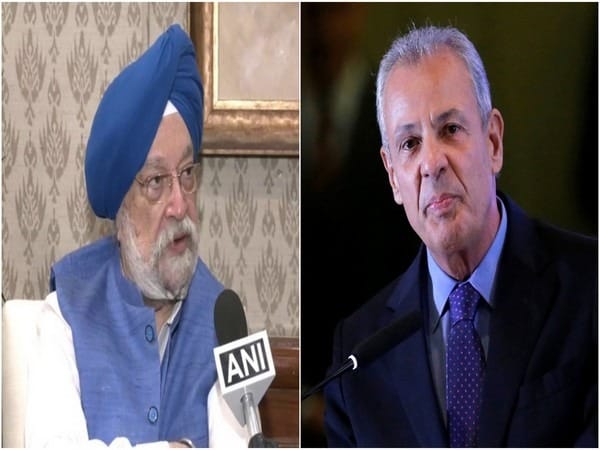New Delhi [India], May 5 (ANI): India and Brazil have agreed to work towards developing an Indian- Brazil Alliance for bioenergy and biofuels. This happened during the recent visit of Bento Albuquerque, Brazilian Minister of Mines and Energy to India.
Indian Minister of Petroleum & Natural Gas Hardeep Singh Puri along with Albuquerque reviewed the long list of bilateral and international activities and initiatives undertaken in the biofuels sectors in recent years, including the exchange of technical visits, the two editions of the Brazil-India Ethanol Talks, Symposium on Aviation Biofuels, launching of the Joint Working Group on Bioenergy Cooperation, Roundtable on India-Brazil Collaboration in Biofuels in the Automobile Sector.
India is the world’s third-biggest oil importer and consumer. It imported the bulk of its oil needs from the Middle East and shipped in about 9 per cent from Latin America in 2021.
“We have expressed to the honourable minister that we are willing to increase our crude from Brazil many times over,” Puri said.
The ministers also stressed on bilateral coordination within G-20 on Climate and Energy, BRICS Energy Ministerial, Bio future Platform, Clean Energy Ministerial, Mission Innovation initiative and IBSA joint Working Group on energy, and the work carried out in the context of the United Nations High-Level Dialogue on Energy.
The leaders reviewed the existing bilateral cooperation across the entire spectrum of the energy sector and committed to enhancing the beneficial partnership between the countries, and in this context expressed satisfaction at the important role bilateral energy cooperation plays in deepening the strategic partnership between the two countries.
As of now Indian state-run companies Bharat Petroleum Corp and Oil and Natural Gas Corp have made investments in Brazil’s oil and gas exploration sector.
The two sides recognized the importance of the robust investment in the Brazilian oil and gas sector made by Indian companies and reaffirmed their commitment to safeguarding existing investments while encouraging further bilateral investments. The two sides highlighted the importance of the bilateral trade in oil and its by-products and expressed their willingness to expand this mutually beneficial trade. The Indian side expressed interest in sourcing crude oil under long-term special contracts.
The Ministers took note of the conclusions of the Joint Working Group on Bioenergy Cooperation, whose first meeting happened on August 6, 2021, and identified priorities for further bilateral cooperation in nine key areas as follows under two broad focus zones: Technical aspects of vehicle use of E20 blends in current fleets; Technical aspects of higher blends of ethanol use in flex-fuel vehicles; Flex-fuel technologies – four-stroke and two-stroke engines (Otto Cycle); Biodiesel implementation; Biogas / Biomethane policy and incentives, and Efficient heat and power generation in sugar and ethanol plants; Sustainable aviation fuels – policies, feedstocks and implementation steps; Second generation ethanol – policy and technologies and Synthetic biology cooperation.
The two Ministers stressed the importance of a constant engagement between the private and public stakeholders of both countries, in order to forge strong and dynamic cooperation in bioenergy and biofuels. In this context, the two Ministers took note of the recommendations of companies of the two countries, based on their various interactions including the recently concluded Roundtable on India-Brazil Collaboration in Biofuels in the Automobile Sector.
Some of the recommendations included: establishing a public policy to use ethanol as a gasoline substitute to reduce external dependence, increasing the octane number of Otto cycle fuels and reducing greenhouse gas emissions; using the Life Cycle Assessment from well-to-the-wheel to evaluate sustainable mobility, considering energy generation step; developing a roadmap to introduce flex-fuel and hybrid flex-fuel vehicles; joint development of ethanol and biomethane fuel cell vehicles; collaboration between the two countries to develop less water-intensive and higher sugar yield crop and water, genetic management and biotechnology of energy crops leading to first, Second and third-generation biofuels and development of biotechnology for liquid biofuels and valorization of agro-industrial residues.
They further agreed that a thriving international market for sustainable bioenergy and biofuels will be essential to the design of low-carbon global vehicle platforms, as well as to the development of new technologies and the establishment of economies of scale in the bioenergy sector.
The Ministers also agreed that it is critical to reinforce the promotion of sustainable bioenergy and biofuels at the global level, which would diversify options for energy security, boost rural development, bring about technological and industrial innovation, and create jobs and opportunities while reducing local and global emissions. (ANI)
This report is auto-generated from ANI news service. ThePrint holds no responsibility for its content.






